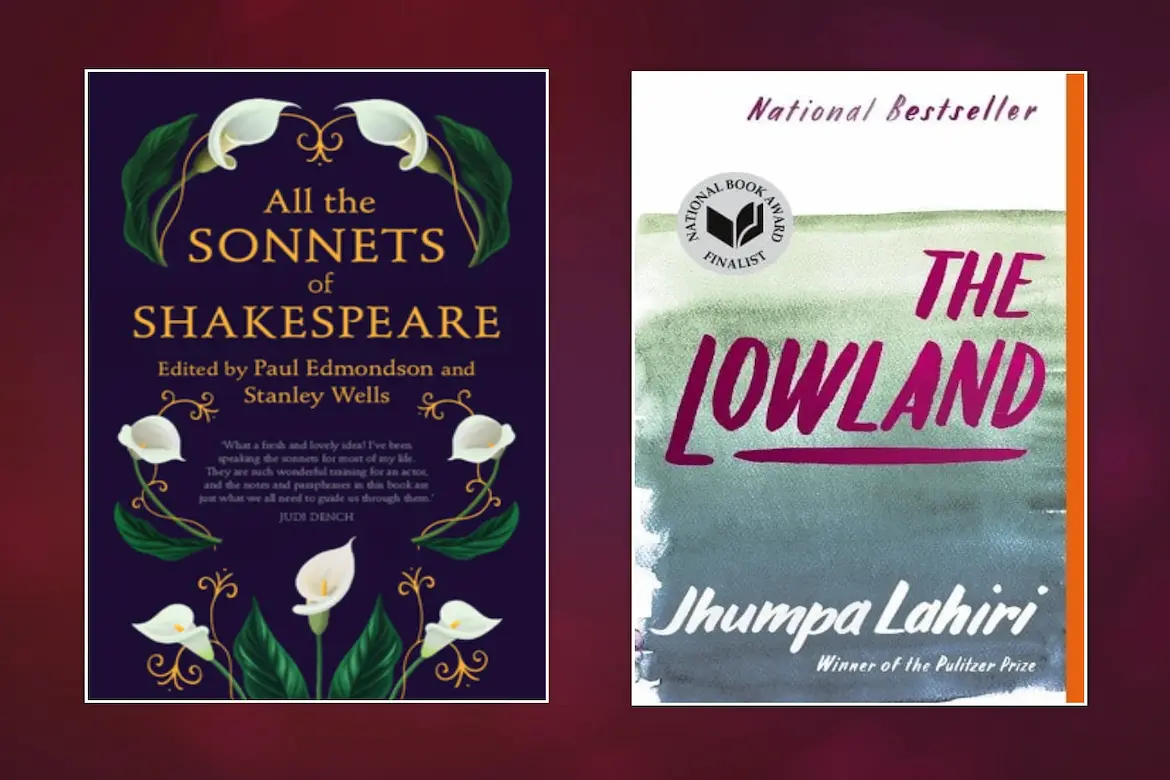This week’s LitStack Rec offers a look at Shakespeare’s Sonnets, for poetry lovers and lovers of love poems, and also a look at a video from Jhumpa Lahiri, whose books we also highly recommend. You can find them below, and order them today.
You can find and buy the books we recommend at our bookshop list of LitStack Recs.

Table of Contents
All of Shakespeare’s Sonnets


It wasn’t until I was assigned one of the “lesser” sonnets (or at least lesser known) in a collegiate English course and forced to write a paper sans footnotes and filled with my original interpretation of the meaning and purpose of the work as expressed through the language, that I truly glimpsed the Bard’s genius. I had struggled with the paper for weeks, and on the eve of the deadline for submission, in the final hours of pulling an all-nighter, I despaired of having a workable paper to present to a professor I both admired and feared.
But suddenly, after a dose of No-Doze and numerous cups of coffee, at 4:00 am, when my reason was parsed away and all I had left was raw emotion, I read the sonnet out loud for the umpteenth time and had my eureka moment when “how it spoke to me” became clear. In a tiny study carrel in a dormitory stairwell, I furiously typed what I have come to think of as my shining undergraduate effort, one that I am still proud to claim. The sonnet was No. 54, and from that day on, I have loved Shakespeare’s sonnets with a passion undiminished through the years.
O! how much more doth beauty beauteous seem
William Shakespeare, Sonnet No. 54
By that sweet ornament which truth doth give.
The rose looks fair, but fairer we it deem
For that sweet odour, which doth in it live.
The canker blooms have full as deep a dye
As the perfumed tincture of the roses,
Hang on such thorns, and play as wantonly
When summer’s breath their masked buds discloses:
But, for their virtue only is their show,
They live unwoo’d, and unrespected fade;
Die to themselves. Sweet roses do not so;
Of their sweet deaths are sweetest odours made:
And so of you, beauteous and lovely youth,
When that shall vade, my verse distills your truth.
Shakespeare’s sonnets. In my mind, some of the greatest poetry of all time. I could not recommend any collection of poetry with any higher regard than I do these.
-Sharon Browning
Inspiration From Jhumpa Lahiri For Those Struggling With Their Works-In-Progress.


Your story, whether short or novel-length, has stalled. The characters you thought you knew are strangers, and your latest attempt at rendering this story—the one you’ve believed in enough to spend years creating—appears to have turned to dust in your proverbial hands. These dark days are neither unusual, nor are they a signal your work is proceeding differently than it does for other writers. And if it makes you feel any better, this includes writers who’ve seen their work succeed, who’ve found an audience, accolades and a place in the literary canon. Their daily struggle to complete pages is often no different than yours.
Don’t believe it? Then, my cynical friend, take a break from that latest draft and watch this video from the New Yorker magazine. It features Pulitzer Prize winning author Jhumpa Lahiri on the uncertainty, unpredictability, and mystery of producing creative work. And if it makes you feel any better, this includes writers who’ve seen their work succeed, who’ve found an audience, accolades and a place in the literary canon. Their daily struggle to complete pages is often no different than yours.
Lahiri, the author of two collections of short stories and two novels, including The Lowlands which was nominated for a Man Booker Prize, is an exceedingly modest writer, but her breadth of experience can help you through the seemingly insurmountable problems of your own draft.
You know, there’s this romantic notion that one sits down at one’s desk, and picks up a pen or opens the computer, and within a few months the novel is done. [For Lahiri] “it’s always been a series of fits and starts.
In this five minute clip, Lahiri discusses the “dark room” of creativity, a term borrowed from Henry James:
We work in the dark—we do what we can—we give what we have. our doubt is our passion and our passion is our task. The rest is the madness of art.
Hopefully, madness will not overcome you, but rather, as James instructs, and Lahiri reminds us, you will become accustomed to working in the dark, and become comfortable with those “fits and starts,” and with getting it wrong many times before getting it right.
So take a break from that passage that’s making your brain ache and watch this clip. It won’t get your draft in shape, but it will help you see that the process isn’t just tough for you, it’s tough for even the best writers.
—Lauren Alwan
Other Related Titles

Other LitStack Resources
Be sure and look at our other LitStack Recs for our recommendations on books you should read, as well as these reviews by Lauren Alwan, and these reviews by Sharon Browning.
As a Bookshop, Malaprop’s, BAM, Barnes & Noble, Audiobooks.com, Amazon, and Envato affiliate, LitStack may earn a commission at no cost to you when you purchase products through our affiliate links.


